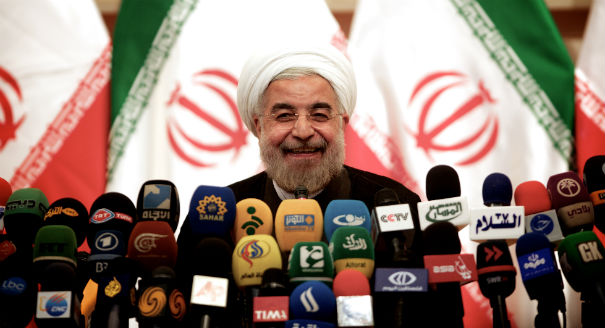For years, Moscow used to be concerned about two things in relation to Iran.
One was the possibility of Tehran acquiring nuclear weapons and marrying them to its missile technology. Apart from the large-scale regional and global repercussions, this would create a powerful competitor to Russia just across the Caspian Sea. In turn, that would also impact on the fragile geopolitical balances in the Caucasus and Central Asia.
The other worry was a U.S.-Israeli military strike against Iran in an effort to prevent Iran’s acquisition of nuclear weapons. From Russia’s perspective, that kind of preemptive action would be even worse than a nuclear Iran, as it would destabilize the Middle East still further and radicalize Muslims, including in Russia itself. Such an attack would also carry the danger of drawing Russia into the fray—something that President Vladimir Putin dreads.
In recent weeks, a new concern has surfaced: the budding rapprochement between the United States and Iran. Commenting on this development, a Russian television anchor with connections to the Kremlin has suggested that the Iranian nuclear issue should not be resolved by Washington and Tehran alone. Negotiations with Iran have so far been held by the five permanent members of the UN Security Council plus Germany (P5+1), and that should remain the case in the future, according to Moscow.
This is an interesting statement, for in the past the Russians have basically suggested that the chief obstacle to reaching a deal with Iran was Washington’s hostility toward Tehran. The United States, for its part, has insisted that nonproliferation is an issue for the international community as a whole.
Yet, there is unlikely to be a “Nixon in China” moment in U.S.-Iranian relations under President Barack Obama. Iranian President Hassan Rouhani is no Zhou Enlai, China’s former premier, and Supreme Leader Ali Khamenei is no Chairman Mao. There are also no Henry Kissingers in the White House anymore, and, more importantly, there is no Soviet Union to bring mortal enemies together.
One could argue, of course, that U.S. and Iranian interests intersect in a number of areas, such as Afghanistan and Iraq; but U.S. involvement in both is now waning. One could also point out that Iran looks—and is—more stable than any of its Arab neighbors, and that the United States could re-create an Iranian “leg” to support its Middle Eastern strategy; but the question is whether there can be a strategy in the absence of long-term goals.
Serious moves toward a political settlement in Syria would also require U.S.-Iranian collaboration, which in turn would help build confidence between the two and facilitate a deal on the nuclear issue. But Washington looks confused and distracted at the moment, and not everyone in Tehran applauds Rouhani’s conciliatory gestures toward Obama.
The current situation, in which there is mutual interest in rapprochement but also formidable obstacles to normalizing U.S.-Iranian relations, creates a potential opening for Moscow. Of course, this is not new. For a decade and a half, the Russians have been trying to act as mediator between the United States and various problem states—Slobodan Milošević’s Serbia, Saddam Hussein’s Iraq, Kim Jong-il’s North Korea—only to be mistrusted by Washington and eventually disappointed by their clients.
Now, in Syria, it appears that for the first time Moscow has been able to deliver an initial result. If the Syrian chemical weapons disarmament goes ahead (a huge “if”), and if that leads to a ceasefire and a political settlement (a scenario that looks almost impossible today), then Russia will have succeeded in a qualitatively new role of international security broker.
Iran and Russia have a long and not always happy history of relations. The Iranians remember the empire to the north they lost when it was annexed by the Russians in the nineteenth century, as well as the de facto partition of Iran into spheres of influence by the Russians and the British in the twentieth century. The Russians still recall the lynching of their entire embassy—including the ambassador, an outstanding playwright—by an angry Tehran mob in 1829.
More recently, Communism and revolutionary Islam created reciprocal anxieties across the Soviet-Iranian border. By the turn of the twenty-first century, however, the relationship became more pragmatic, with Russia emerging as Iran’s sole provider of nuclear energy technology and military hardware.
Moscow’s previous attempts to help facilitate an agreement between Iran and the international community on Tehran’s nuclear program have been largely unsuccessful. To a significant degree, this was due to the persona of Iran’s former president, Mahmoud Ahmadinejad.
For Putin, Rouhani is a much-preferred partner to his predecessor. If Putin can work with Rouhani to move closer to a compromise formula on permitted levels of enrichment and the degree of transparency of the Iranian nuclear program, the Russian president will strengthen his country’s international stature. With a Nobel Peace Prize winner in the White House, Putin has a chance.






.jpg)